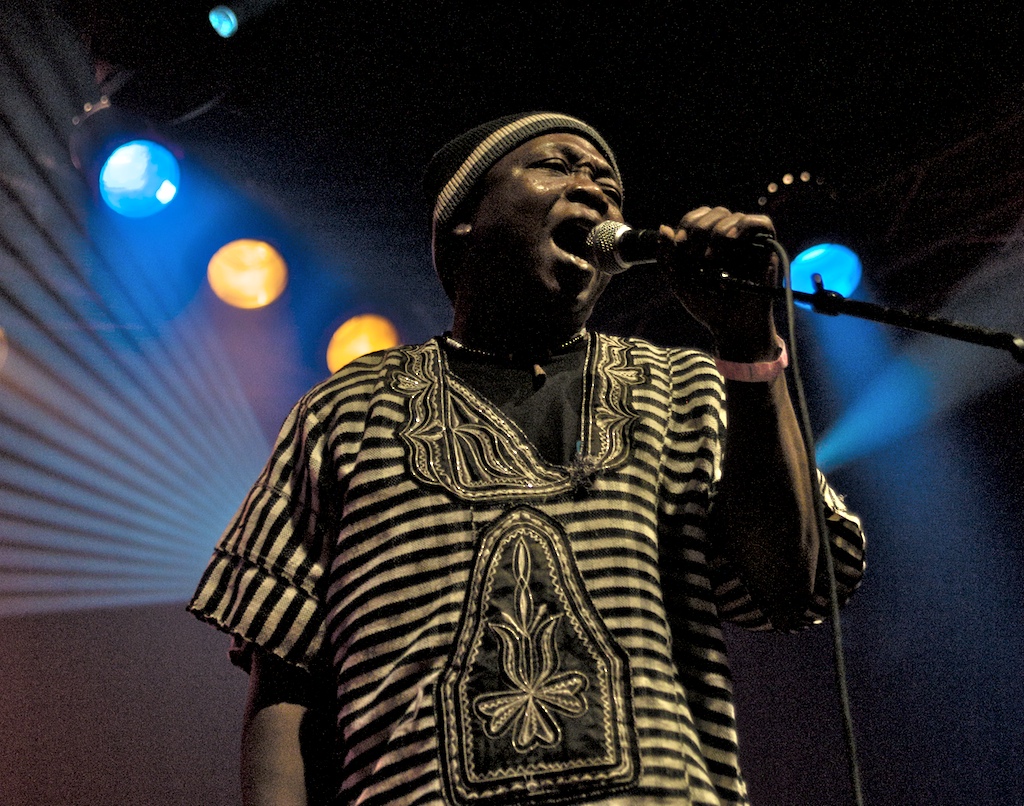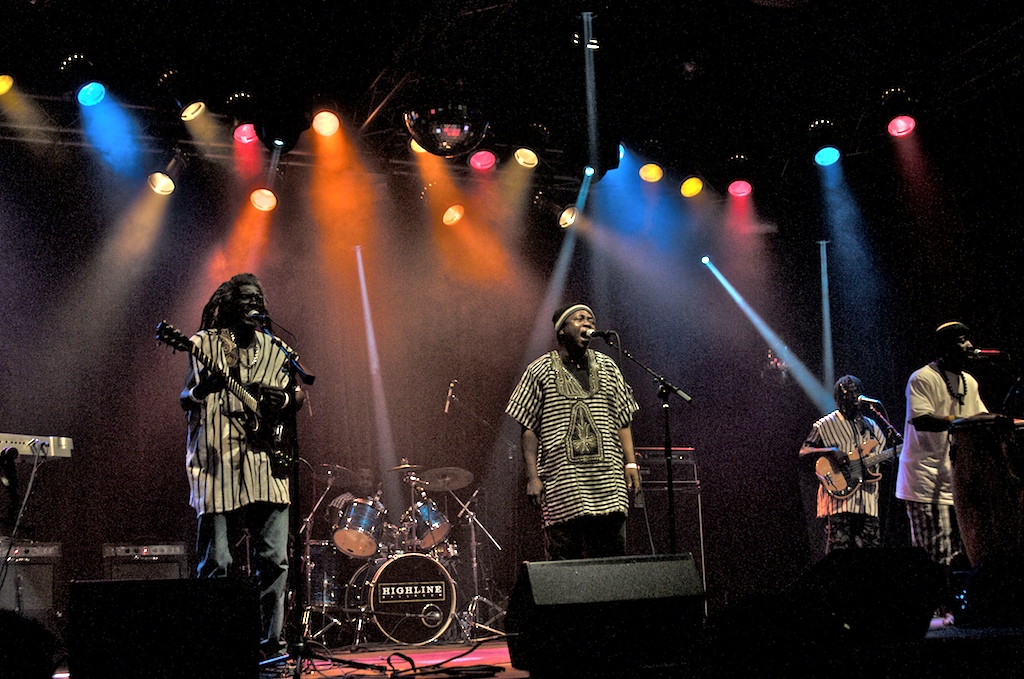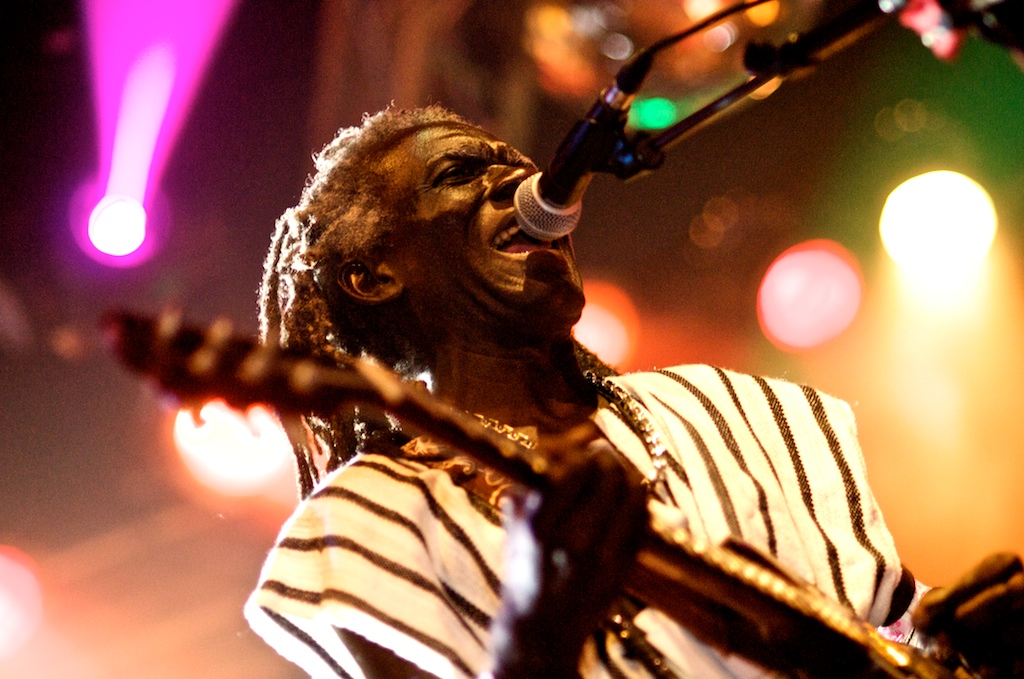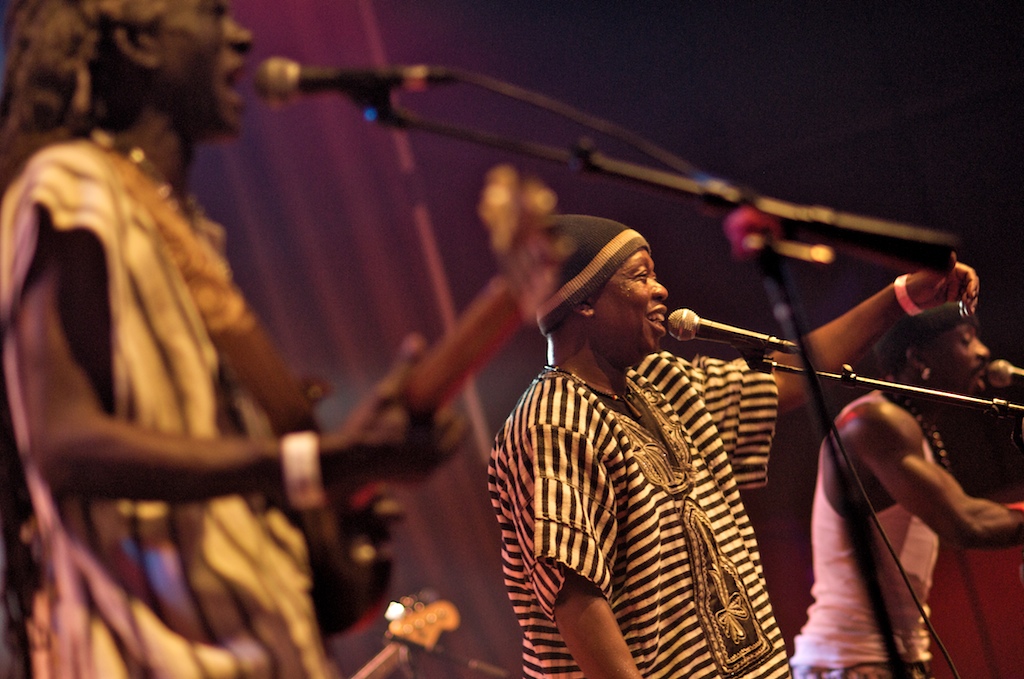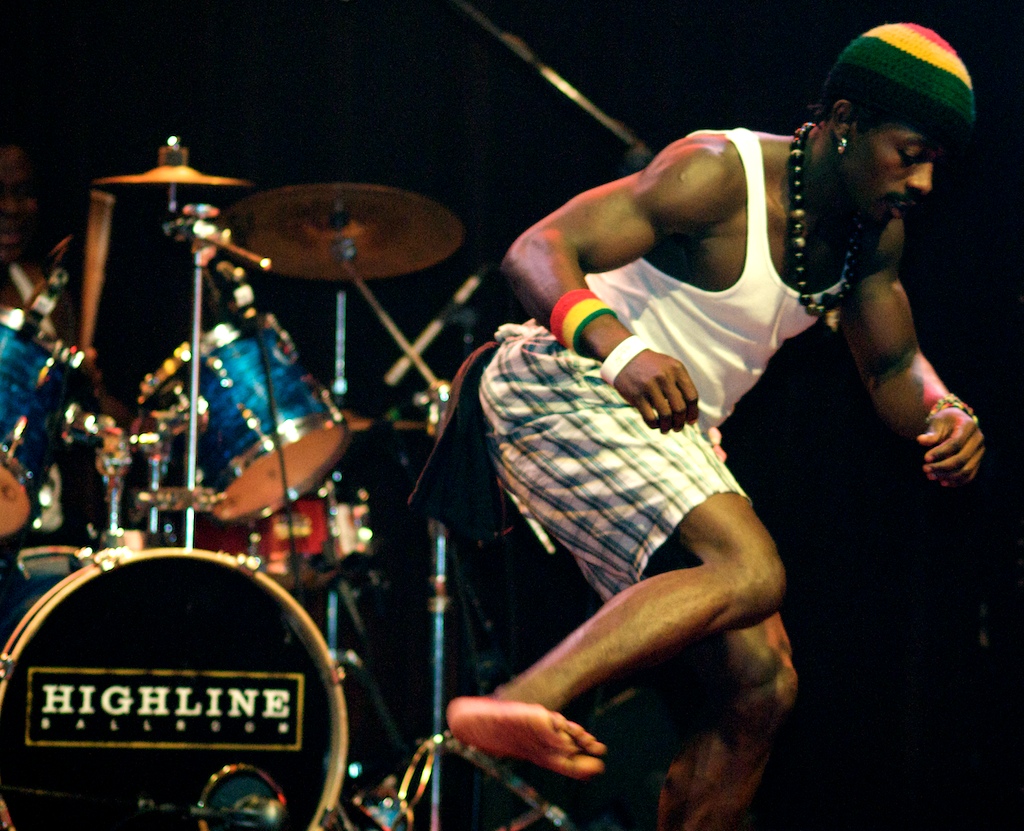Afropop producer Banning Eyre got the chance to talk to Rueben Koroma, the lead singer of Sierra Leone's Refugee Allstars, before the band played (and totally rocked) the Two Boots Pizza 25th Anniversary concert in New York City. The bands music is featured on the program Afropop Roadshow: Spotlight Sierra Leone.
Banning Eyre: Rueben! Welcome back to Afropop! It’s great to talk again.
Rueben Koroma: Yes it is.
B: So Rueben, the last time we met was in Brooklyn, when you were recording this amazing record, Radio Salone.
R: Yes.
B: Tell me about that experience. You know it’s funny to me because it was so cold and snowy, and yet you made such a warm record.
R: Well we tried, we really tried. But I was not comfortable. Most of the members were not comfortable because we are not used to that severe kind of cold. You know? But whatever you have to do, you know? Like the saying, “Necessity compels.” So we know that we had something to do and we had to do it. But the experience was not too good. You know?
B: Do you think it brought something out? Because it’s a really terrific record, the playing, everything about it just feels so great.
R: I feel so too, you know? It all has to do with determination. We were determined before we came. We knew that we wanted to do a good record, and so whatever the constrain, we tried to overcome that.
B: This is your third record. What’s different about it?
R: Well the difference here is that on the first and second records, we had a mix of a reggae and African music, just about equally. But this time around, this album I think is more African than reggae. We tried to include like, gumbe interludes. gumbe is a music from our country. We just wanted people to know that Sierra Leonean is a beautiful culture. Most of the people only know Sierra Leone through the brutal war. Well we want to tell them that there are beautiful things in Sierra Leone. You know?
B: Like gumbe. Tell us a bit more about gumbe. Where does it come from? What do we need to know about it?
R: Well the gumbe beat is a kind of beat that we play with hand drums, shakers, and cow bells back in Sierra Leone. We use that for parties you know, festivals, burial ceremonies- many ,many activities. It’s very popular in Sierra Leone, we have many, many, Gumbe groups.
B: So these interludes that are on this record, is that the whole band playing drums and singing? Or are you bringing in other musicians who-
R: No, no musicians. Just the whole band playing and singing. Because we are all Sierra Leoneans, and it’s part of our culture, so we want to show it out in the world.
B: So anyone who is a musician in Sierra Leone can participate on some level in gumbe, is that right?
R: Not only being a musician, every Sierra Leonean knows what gumbe means. And when you play gumbe, you will sing because it’s a music that allows everybody to participate. You know when someone sings, you can see maybe 100 or 200 people will respond to the singing. That’s how we do it so…
B: What does that word mean, gumbe?
R: Well gumbe means just like a joke. You know, just like fun. Let’s have fun.
B: Pleasure, fun, enjoyment. Well that certainly comes through, it’s very nice.
R: Yeah
B: The title of the record, Radio Salone. What does that mean?
R: Well, Salone means Sierra Leone. You know we speak broken english in our country which is called Krio. And in krio, if you want to call the country, you call it Salone instead of Sierra Leone. Sierra Leone is by the English people and everybody in the world. But in our krio language we call it Salone. And so if we say Radio Salone we mean that it’s a radio from Sierra Leone. You know what I mean?
We recognize radio as a very powerful source of our inspiration. During the struggling days, you know, we cannot afford to buy DVDs, VCDs, record players- No! All our means of listening to music is through the radio. If you listen to Bob Marley, it’s through the radio. If we listen to Peter Tosh, it’s through the radio, if we listen to Jimi Hendrix, Aerosmith, the Beatles- all these big stars, we listen to them through the radio. Because the radio is the source of media, you know? It’s through the radio that we got our source of inspiration. We just want to acknowledge the radio.
B: You guys have just made an arrangement with the American World Food Association. Can you tell me about that?
R: Yes, we made a partnership with World food program. When we were living as refugees, the world food program was the NGO responsible for distributing food to us. So I know they are doing a very good job feeding people. Well, they said they wanted to partner with us, they wanted to promote the video tape, the Big Fat Dog video. They needed to raise money and feed people, so we accepted that condition, and tried to tell people everywhere we perform that they should donate some money to WFP, and then we allow them to feed people around the world.
B: And you know these guys from way back? They were actually giving food in the refugee camps, so it’s a long relationship?
R: Well not particularly the USA branch, but I know that the WFP is the NGO that was responsible for our food. They sustained us for many years, because we lived in the refugee camps for 18 years. They have been doing good work. So when they decided to partner with us and promote the Big Fat Dog video, to raise money and to feed other people, I just felt that it’s nice to be responsible.
B: So let’s talk about that song. Tell me about Big Fat Dog?
R: Well, Big Fat Dog talks about people who have money and do not want to share. In the first verse it talks about “I go to the village, I meet friends and they were hungry, and they went to the market and cooked but never gave it to me.” The second one talks about the city, and what is happening in the city . “I went to look for a job and I met a businessman, he was so rich he could offer me a job. But he said all the jobs have been mechanized. You know that means no jobs for humans just machines." It’s like just trying to tell what is happening.
B: It’s true this is an African record more than a reggae record, but there are still some really great reggae songs too. I want to ask you about reggae sounds, the message. Reggae is very important to you to, no?
R: Well it’s important, reggae, its important to us because you know Sierra Leone has a connected history with like Jamaica, and the Caribbean, you know? Long ago when slavery was abolished, the British people bought the land, to bring back all the slaves. That is why the capital city is called Freetown. Up until now the central part of Freetown is called Maroontown, because the maroons were brought from Jamaica, a large number of them–and some of the Nova Scotians, you know some parts of Canada. They were brought to Freetown. So all of those people, they came with different influences, so there is a related history with Jamaica and Sierra Leone.
Because of that, when reggae started in the early 70's, when I was a young man, I started to listen to it. I think everybody in Sierra Leone loves reggae music. We play good music in Sierra Leone. Only Sierra Leone was too far for the west to recognize. Like America and Jamaica are very close, so that’s why Jamaica was recognized for reggae music, but good music was playing in Sierra Leone at that time, but...
B: Amen, Amen. The other reggae song “Walk it brighter.” You talk about Mount Zion, there’s all these biblical references. That's a heavy song isn’t it?
R: Well, when you talk about Zion you talk about a place where you get your salvation. It shows our beliefs. We believe that at the end of the day, the world results to paradise. We believe that our kind is growing to an extent that results to a kind of state where there will be no trouble. There will be no sickness and then, well... We have to make our effort.
That’s why, like I've always said- whatever you promise, whatever the promises you have made, please try to fulfill them, no matter what the constrain. You have to put your people’s interest first. The song talks about people who are high in authority- they have to care for the people, they have to put the people’s interest first, and put their country’s interest first, and make things possible so we can see this Mount Zion. So that’s the whole meaning. That’s why I say walk it brighter, brighter than the former, and brighter for our future. It’s a kind of invocation trying to tell people, people with authority to really walk it brighter, brighter than the former. Let them walk it brighter so that people can live comfortably. That’s the message.
B: Let’s talk about one of the great African songs on here, Mother in Law.
R: Well, mother in law talks about, you know a mother in law, like your wife’s mother. You know sometimes, well I don’t know about here, but it talks about the African set up- sometimes the mother in law has power over her daughter. If you are loving her daughter and she doesn’t love you, it’s a problem for you. She can obstruct the love. And sometimes these mother in laws, when you have money they will treat you well, but it if you don’t have money they will treat you very badly. Maybe they will take the women away from you. These are the things we try to express that, you know, every day happening, it is happening in Africa, but I don’t know about the set up here.
B: It’s not just in Africa. The mother in law relationship is always very difficult. There are a lot of songs and plays and stories about that. And jokes, mother-in-law jokes. So yes- you're tapping into a rich vein there. But musically, tell us about the style of the music. They are all great songs but I especially like that one musically.
R: Ok, well- the style of music there, it's really a modified version of gumbe. Most of African music we play, maybe some people can call soukous. But I don’t think its soukous, because in our culture we have something we call jolly. Its spelled like j-o-l-l-y, just like jolly. We tap hand drums and then people summersault- they do like gymnastics, and they dress very well.
B: What’s the beat?
R: Jolly
B: But can you show us the beat?
R: [plays beat]. That’s what we play. People say that is soukous, but we have it originally in our culture, and we call it jolly.
B: Maybe the Congolese stole it from the Sierra Leoneans
R: Well, maybe. Because there is a history of Congolese being in Sierra Leone, you know? When slavery was abolished, the British people brought military officers to capture the slave masters. And because slavery was very profitable, the slave traders were persistent, and when the military captured them they would bring them to Freetown. They built courts there, and they would jail them, jail the slave trader, and then all the slaves they captured that had not been sent to slavery were freed in Freetown. And they give them a place- up until now in Freetown, we have Congotown. They were there for some time before they went back. We call them the re-captives, it’s in our history.
B: I just wanted to ask about that first song, which is also in that style. Gbara Case. What is that song about?
R: Well Gbara Case talks about lovers. It says my people, when you are in love with someone, and then somebody comes and tries to interrupt into your love affair and tries to do things that will bring a separation, you know, and it’s just a warning. Some people will criticize the ones you love, some people would say she’s ugly, she’s too fat, she’s too tall. Now when I am singing, this reflects my wife, you know Grace. Many people were criticizing her, and I was telling them- "Don’t hate her, you don’t create her, and you are not the person who loved her for me." I love her myself, and I need her for myself. So that is the meaning of the song.
B: Nice! How is Grace doing now? Is she back home?
R: Yes she is doing very well, she is at home and she is taking very good care of the kids.
B: Let’s just talk a minute about back home. What’s it like for the band there now? Do you have a good reputation? What kind of places do you play when you do shows there?
R: In Sierra Leone people really are very proud of us. At any time we go, we have a specific place we play, its called Aces. When we play there, we call it reggae night. It's every Thursday, and most of the people travel to there, they always see us there.
B: What about the music scene, more generally, is it growing up? Because I know that when we talked a few years ago, things were starting to come together this way and that, and there were some rappers you talked about. But has it grown? What’s the status of the music scene in Sierra Leone now?
R: Well, it’s a little bit better because the government has made a law against piracy. You know formally people just pirates our CDs, but now it is a law that no one can pirate our CDs. In Sierra Leone we still have live music going on in the cities, but most of the musicians are just people who jump into the studio and ask studio engineers to fix beats for them, and then they do their rap and everything, and they call themselves musicians. We have many of them there. But we still have live musicians like us. We still have bands in the city, people who play live music just like us.
B: A couple of weeks ago, I saw and interviewed Bajah of Bajah and the Dry Eye Crew and he’s got a nice band now. They’re doing a very live band kind of thing. He’s still in town. Maybe he’ll show up tonight.
R: Cool, cool. Yeah- I think I introduced that guy to the mike.
B: Is that right? Tell me because I saw him get up with you guys the last time you were here.
R: His brother is a friend of mine, his elder brother, and he bought few equipment for us, and we were playing in his brother's club. Bajah was a little boy back then, and then his elder brother told me, he say “this boy likes to sing” and I said, “give him to me. I will show him the stage,” and then anytime we play, I would call him and give him the mike and say “sing on boy.”
Radio Salone, the new album from Sierra Leone's Refugee Allstars is out now on Cumbancha Records.








